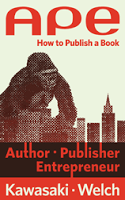6 Self Publishing Rip-Offs Authors Must Avoid
The allure of publishing a book is so powerful that unsuspecting writers overpay for services or allow unscrupulous companies to rip them off.
We're not referring to situations where you paid a fair price only to find out that the editor, copyeditor, or cover designer was mediocre. That's your fault for making a poor choice. We are not referring to paying for services that you don't have the time or inclination to perform yourself. Value is in the eye of the beholder.

We're talking about rip-offs involving grotesque overpayment and purposeful deceit. Here are the warning signs of an impending rip-off:
* Get-rich-quick. Does the company's website and promotional material feel like they're promising ways to get rich quick? Self-publishing is not the way to get rich quick, and anyone who tells you that is either a liar, a crook, or an idiot. Turn on your bull-shiitake detector in this situation.
* Payment up front. A legitimate publisher will never ask you for money up front to publish your book. The whole concept of an advance is for the publisher to pay you up front, not vice versa.
Avoid independent consultants and contractors who ask for 100 percent payment in advance for services. The most you should pay is 50 percent up front. Upon acceptance of the work, pay the final 50 percent. This is fair to both parties.
You may have to pay companies in advance for services. Theoretically, they are more established so the likelihood of them botching the job or disappearing is minimal. Still, try to pay up front for as little as possible.
* Total fees exceeding $4,000. If you're about to pay any entity (especially author-services companies) more than $4,000, step back and evaluate your decision. You may pay a total of $4,000 for all services (content editing, copyediting, cover design, layout design, and production), but there are few individual services in self-publishing that should cost more than $4,000.
* Guaranteed marketing and blog exposure. No one can guarantee reviews in publications such as the New York Times or Publishers Weekly. No one can guarantee that bloggers who matter will review your book. If you want dozens of reviews in important blogs and publications, (a) write a good book, and (b) start developing relationships with reviewers and bloggers right now.
* Minimum copies from a printer. This is a buy-on-demand from a print-on-demand world. If you're a novice author, place your first order for twenty copies: one for you, one for your parents, and eighteen for friends. Sure, the per-copy price when you order five thousand copies is a lot cheaper, but you only need this many if you can sell them.
Printers like Lightning Source work so fast these days that you should not fear going out of stock unless your book requires special binding or paper, and it's right before Christmas. And don't forget the Espresso Book Machine for a handful of copies.
Typically crooks and bozos do not advertise that they're crooks and bozos, so you need ways of checking out vendors:
* Search in Google for the "[name of the company] + complaints."
* Ask if anyone in your social-media circles has used or heard about the company.
* Search for the company on the Better Business Bureau website:http://www.bbb.org/.
* Search for the company at Writer Beware: http://accrispin.blogspot.com/ and Preditors and Editors: http://pred-ed.com/.
Finally, if you do get ripped off, you should let your fellow authors know so that they can avoid the same fate.

Guy Kawasaki has written 12 books, 10 of which were traditionally published. His newest book is APE: Author, Publisher, Entrepreneur - How to Publish a Book, which helps people understand how and why to self-publish.
APE: Author, Publisher, Entrepreneur - How to Publish a Book, by Guy Kawasaki and Shawn Welch, is available as an eBook ($9.99) and in paperback ($24.99). Visit http://apethebook.com/








Published on August 04, 2013 22:00
No comments have been added yet.



